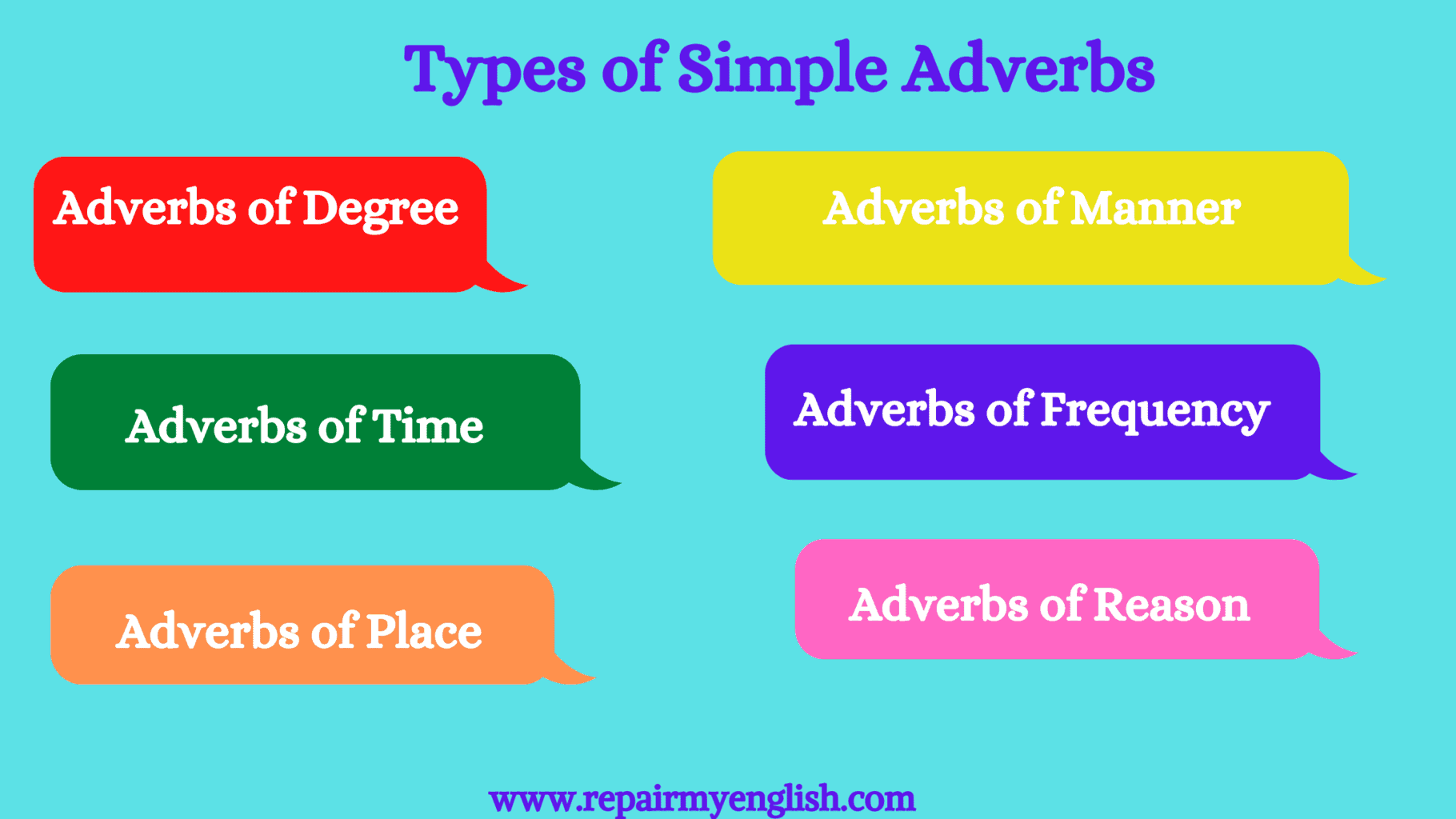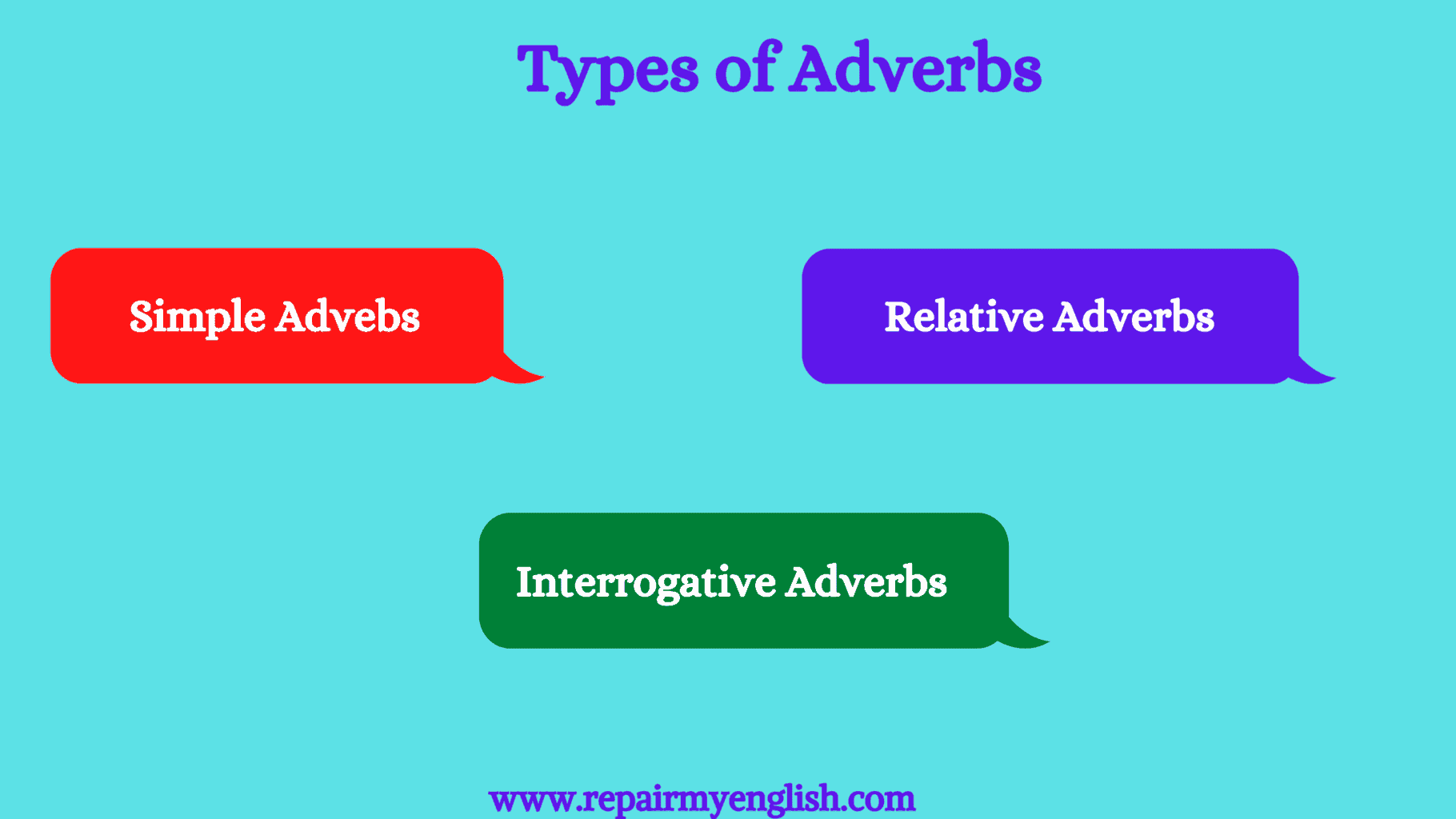In this blog, you will learn the definition of adverbs, types of adverbs and example sentences.
Definition of Adverbs:
Adverbs are words (or sets of words) that modify other adverbs, adjectives, and verbs. It specifies when, where, and how an action is carried out and its quality or degree.
Many adverbs end in -ly; however, some -ly words (like friendly) are not always adverbs. Many words can be adjectives and adverbs depending on their function in the sentence.
Adverb Example Sentences:
- We frequently visit our grandparents at weekends.
- I am always late for work.
- You should certainly discuss your case.
- He is very hard-working.
- I seldom go shopping.
There are 3 types of adverbs:

Simple Adverbs
Interrogative Adverbs
Relative Adverbs
What are Simple Adverbs?
These adverbs are the most commonly used and usually contain only one word.
Simple adverbs are further divided into 06 sub-parts.
1) Adverbs of Degree:
Adverbs of Degree explain how something occurs to a certain extent. They respond to “how much?” and “to what extent?” These adverbs can modify verbs, adjectives, and other adverbs.
Examples:
• Rahul is completely in agreement with Siddharth. (To what extent does Rahul agree with Siddharth?)
• Annie is a stunning woman. (To what extent is Annie attractive? (How stunning is Annie?)
• Suman was driving very recklessly. (Did Suman drive dangerously to any extent? (Did Suman drive dangerously?)
Adverb of Degree Example Sentences :
• We have enough food for dinner.
• This apartment is very expensive.
• We are so glad to attend the seminar.
• I feel incredibly lucky to receive the honour on that day.
• The weather is extremely cold.
2) Adverbs of Manner:
Adverbs of manner describe how or in what manner something was done. They are generally used to modify verbs and are commonly found at the end of clauses. The most prevalent adverbs, those ending in -ly, fall within this category.
Adverb of Manner Example Sentences:
• I think you should drive slowly.
• He speaks German fluently.
• Neha dances beautifully.
• Siddharth painted the wall awfully.
• You should write the report neatly.
3) Adverbs of Time:
Adverbs of time provide additional information about when a verb takes place. These adverbs are typically used at the beginning or end of a sentence. We’ll put it at the beginning of a phrase if it is essential to describe the exact time something happened.
Adverbs of Time Example Sentences:
• Have you watched Friends Season before?
• Faculty must report to the Director right now.
• We will join you soon.
• Reena enjoyed the dinner party yesterday.
• I am going to meet my grandparents the day after tomorrow.
4) Adverbs of Frequency:
Adverbs of Frequency are typically the adverbs of time that answer the question “How frequently?” or “How often?” They inform us about how frequently events occur. The adverb of frequency is often used in Simple Present Tense to denote habitual action.
Examples are as follows:
Example 1: daily, weekly, and annual
Example 2: frequently, occasionally, and often
Example 1 and example 2 are entirely different. We can tell how often something happens when we use phrases like daily. The words in example 1 refer to a definite frequency. However, words like often, give us a notion of frequency but not a precise number. The words in example 2 refer to an indefinite frequency.
Adverbs of Frequency Example Sentences:
• I have warned you thrice.
• We seldom visit our grandparents.
• She has to submit her weekly assignments.
• My grandmother always helps the weak.
• We usually go for outings on Saturday evenings.
5) Adverbs of Place:
Adverbs of place describe where an action takes place. These adverbs are generally used after the main verb or the clause they modify. Adverbs of this type do not modify adjectives or other adverbs in any way.
Adverb of Place Example Sentences:
• We are going back to the shopping mall.
• I want to work here for at least one year.
• The dinner was arranged outside.
•The baby ran towards the nanny.
• Let us go inside because it is extremely cold.
6) Adverbs of Reason:
If you want to reply to something beginning with ‘why’, the adverb of reason will be the answer. As a result, an adverb of the reason can be used to express the reason for performing a specific task. Consider the following example:
I ate dinner in the Taj because I admire that place.
So, if you ask me, why did I go there? I will reply, “because I admire that place.” Therefore, the adverb “because” shows why an event occurred.
Adverb of reason Example Sentences:
• I dance because I like dancing.
• I have my final exam tomorrow, so I need to study rigorously.
• The manager has major heart surgery; therefore, he won’t join back.
• I started brisk walking so that I could lose weight.
- We gifted him crockery in order to improve his culinary skills.
What are Interrogative Adverbs?
As the name indicates, interrogative adverbs are used to ask questions. These adverbs include: Why, where, when, and how questions. When using these adverbs to form questions, we must reverse the subject with the helping verb. So, ‘why should I’ and NOT ‘why I should’.
Examples:
• Where are the scissors?
• How did you cook the multi-bread?
• When do you go to the gym?
• How do you manage all the stuff?
• How did you spend your weekend?
Types of Interrogative Adverbs:
- Interrogative Adverbs of Time
- Interrogative Adverbs of Place
- Interrogative Adverbs of Reason
- Interrogative Adverbs of Manner
- Interrogative Adverbs of Amount, Quantity and Degree

Interrogative Adverbs of Time:
An interrogative adverb of time asks a question regarding a time-related subject.
When is typically the interrogative adverb? How can it also be used to ask questions about the present or future? (primarily how long, how often, how soon)
Adverbs of Time Example Sentences :
- When are you leaving for the airport?
- When will you arrive at your destination?
- How long will you stay in the hotel room?
- How often the doctor visits the patients?
- How soon can you get back to work?
Interrogative Adverbs of Place:
“Where” is an interrogative adverb referring to a location.
Example Sentences of Adverbs of Place:
- Where does Neha work?
- Where do you live?
- Where is the meeting going on?
- Where did you attend the seminar?
- Where do you like to spend your holidays?
Interrogative Adverbs of Reason:
“Why” is an adverb of the reason that refers to a reason.
Example Sentences of Interrogative Adverbs of Reason:
- Why do you lack confidence during Public-Speaking?
- Why does he always criticize me?
- Why are you leaving your job?
- Why are you dependent on your parents’ pocket money?
- Why have you not submitted your assignment?
Interrogative Adverbs of Manner:
“How” is used as Interrogative Adverbs of Manner that refers to the manner.
Interrogative Adverbs of Manner Example Sentences:
- How did you enrol on the course?
- How did the students perform the experiments in the laboratory?
- How will you cook this recipe?
- How was your interview?
- What was the response of the customers about the product?
Interrogative Adverbs of Amount, Quantity and Degree:
“How” is an interrogative adverb referring to amounts, quantities and degrees.
Interrogative Adverbs of Amount, Quantity and Degree Example Sentences :
- How much money do you get as your current salary?
- How many chocolates have you distributed among the children?
- How quickly can you solve the puzzle?
- How tough was the competition?
- How strange he behaved at the party?
What are Relative Adverbs?
These adverbs are used whenever we want to connect or join two phrases. These adverbs include: where, when, why and how. For example:
This is the house where I spend my childhood.
In the sentence mentioned above, there are two sentences:
Sentence 1: This is our house.
Sentence 2: I spend my childhood.
These two sentences are joined by the word “where”, which is a relative adverb.
Relative Adverbs Example Sentences :
- I can’t understand the reason why he neglected me.
- This is the city where I want to spend the rest of my life.
- We were confused about why Sarah tried to contact me.
- The dress that I bought from the shop is very uncomfortable.
- This is the park where they go for a walk daily.

